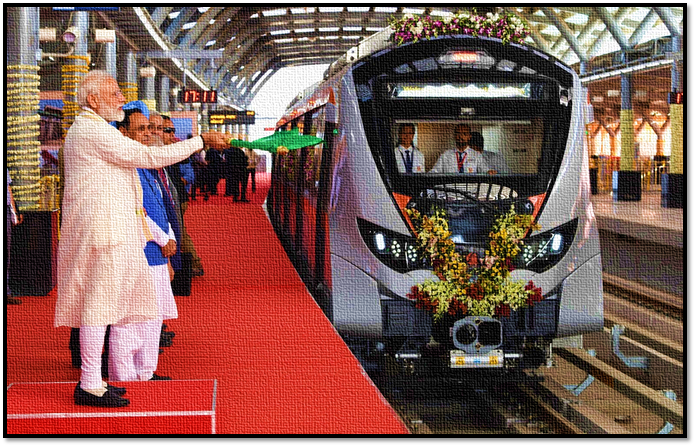Context: TheIndian Metro System recently completed a span of over 1,000 km across 11 states and 23 cities and became the third-largest Metro system in the world after China (10,150.17 km) and the USA (1,389.4 km).
More On News:
- On January 5, Prime Minister Narendra Modi launched metro development projects worth over Rs 12,200 crore in Delhi.
- These include the 13 km Delhi-Ghaziabad-Meerut Namo Bharat corridor, easing travel between Delhi and Meerut, a 2.8 km stretch of Delhi Metro Phase-IV, and the 26.5 km Rithala-Kundli section, boosting Delhi-Haryana connectivity.
- These projects mark a significant milestone as India’s metro network, now serving over 1 crore passengers daily, has surpassed Japan in metro rail projects and is set to become the world’s second-largest.
Milestones in the History of Metro in India
- The initiative for a metro system in India began in 1969 with the launch of the Metropolitan Transport Project.
- 1984: India’s first metro line, covering 3.4 km between Esplanade and Bhowanipur, opened in Kolkata, marking the start of metro travel in India.
- 1995: The Delhi Metro Rail Corporation (DMRC) was established, with joint funding from the Central and Delhi Governments, to bring world-class metro services to Delhi.
- 2002: DMRC launched its first metro corridor between Shahdara and Tis Hazari, laying the foundation for a vast metro network in India.
- 2011: Bengaluru’s Namma Metro opened its first segment.
- 2017: Chennai Metro expanded with the inauguration of its first underground section on the Green Line, from Koyambedu to Nehru Park.
- 2020: Kochi Metro completed Phase 1, with the Thykoodam-Petta stretch, marking Kerala’s entry into India’s metro network.
Advancements in Metro Systems
- India’s metro systems are embracing innovative solutions to redefine urban mobility:
- Under-Water Metro: In 2024, PM Modi inaugurated India’s first underwater metro tunnel in Kolkata, where the Esplanade-Howrah Maidan section passes beneath the Hooghly River.
- Driverless Metro: On December 28, 2020, India launched its first driverless metro service on Delhi’s Magenta Line, setting a new automation benchmark.
- Kochi Water Metro: Kerala introduced India’s first Water Metro Project in 2021, connecting 10 islands around Kochi with electric hybrid boats for seamless connectivity.
- Additionally, three new metro projects were approved:
- Bengaluru Metro: 44 km expansion with two corridors.
- Thane Metro: 29 km network to ease road congestion.
- Pune Metro: 5.5 km route to improve urban mobility.

